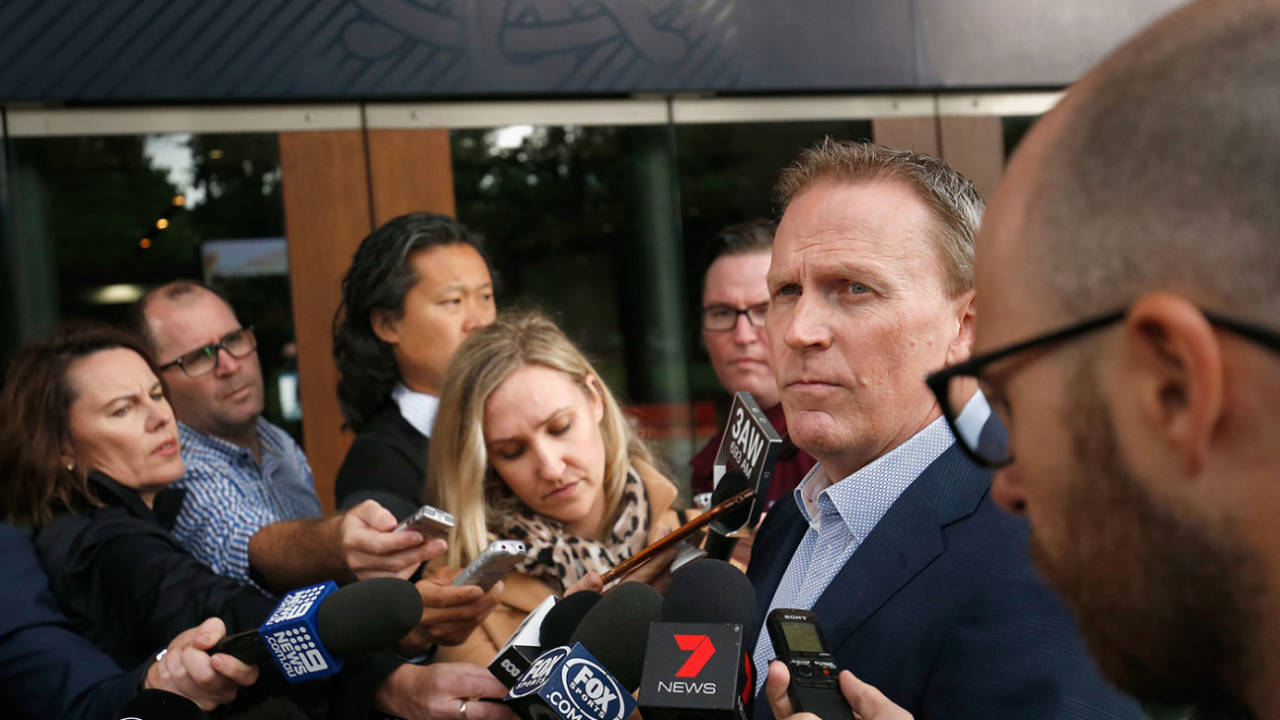CA, ACA attempt to repair fraught relationship
After a lengthy conflict, highlighted by last year's pay dispute, the two bodies attempted to mend fences in a meeting in Melbourne
Daniel Brettig
27-Nov-2018
Kevin Roberts, the Cricket Australia CEO, addresses the media • Getty Images
Australian cricket's governing body and players union will enter the holiday season by being back on each other's Christmas-card lists for the first time in several years, after a somewhat amorphous but fruitful meeting in Melbourne on Tuesday.
Led by the interim chairman Earl Eddings, members of Cricket Australia's board and senior executives shared several hours with the Australian Cricketers Association (ACA) executives, including the president Greg Dyer and chief executive Alistair Nicholson. The meeting was among the 42 recommendations included in the independent review of CA's culture, carried out by the corporates ethics expert Dr Simon Longstaff and the former Test batsman Rick McCosker.
Arguably the greatest troubles confronting both parties are the ones currently being thrown up by the schedule, which has been placed in harsh relief by the struggles of an Australian system missing three of its best batsmen. The former coach Darren Lehmann has termed it "ridiculous", while his successor Justin Langer has been little less kind. Ironically, this summer's tangle of red and white ball, home and away has coincided with the forming of a "scheduling advisory group" as part of last year's MoU, meaning the ACA had more say in this summer's calendar than they did in the past.
While relationships between the two bodies had been witness to what Dyer called a "thawing" in the year since the fractious 2017 pay dispute, the release of the cultural review had created another flashpoint, when the ACA unsuccessfully sought reductions in the Newlands scandal bans for David Warner, Steven Smith and Cameron Bancroft the day after the cultural review was released.
Since the damaging findings were aired publicly, both the CA chairman David Peever and the most senior board director Mark Taylor have quit, amid rumblings that Dyer may consider doing likewise. Taylor, in particular, had expressed frustration that much of his work over the preceding 12 months, to try to patch up relationships between the board and the players' association, seemed to have accomplished little.
However, Eddings spoke in a more conciliatory fashion, of a day when he met with Dyer, with both leaders in something of an uncertain position. Eddings is yet to be endorsed as anything other than an interim chairman, with the influential state associations of New South Wales and Victoria intimating that they want to see the identities of the new recruits to the board - replacing Peever and Taylor - before endorsing any long-term decision over the chairmanship.
"We understand the critical role the ACA plays in representing the players and in driving the success of many of the recommendations made in the Ethics Centre Review," Eddings said. "Today's meeting was an important step, not only for CA and ACA, but for Australian cricket. We look forward to more of them in the new year."
Dyer, meanwhile, has one year left of his term as chairman. "There was significant goodwill between the ACA and CA displayed at today's meeting, given we have much in common, including the objectives of growing and improving Australian cricket," he said. "The Ethics Centre Review provides the framework for a more collaborative relationship between us, and the ACA is committed to supporting this as a matter of priority.
Kevin Roberts, the lead negotiator for CA during last year's dispute and now the new chief executive, made his own gesture towards seeking change in how his organisation dealt with others through the dismissals of senior executives Pat Howard and Ben Amarfio. On the day he was appointed to replace James Sutherland, Roberts had stated that CA's relationship with the ACA needed to improve gradually, without being left to fester up until the time of the next pay deal.
"We obviously can't change history. What we can do is work very closely with the ACA on a sustained basis over many years," Roberts said last month. "To make sure the relationship with the ACA and the players is not defined by negotiations that happen over a few months every five years or so, but the relationship is defined by how we work together, to develop national teams, to support our players and to help them develop as athletes, as competitors and as people.
"We've got over three-and-a-half year until the next MoU needs to be negotiated and our commitment is to build a stronger relationship in that period. We'll experience some challenges along the way, but when we work on really sincerely and genuinely building that relationship with the ACA, and continuing to strengthen our relationship with players, cricket will be in a far better space when it comes time to contemplate the next MoU down the track."
The signing of the MoU last year does provide the clear air in which to forge a better partnership, although there remain plenty of individual areas for debate, not least the suggestion by the ACA executive member, player manager and Cricket NSW board director Neil Maxwell that fast bowlers, such as his client Pat Cummins, be entitled to longer-term central contracts in return for avoiding the extra cash available at the IPL.
Daniel Brettig is an assistant editor at ESPNcricinfo. @danbrettig
